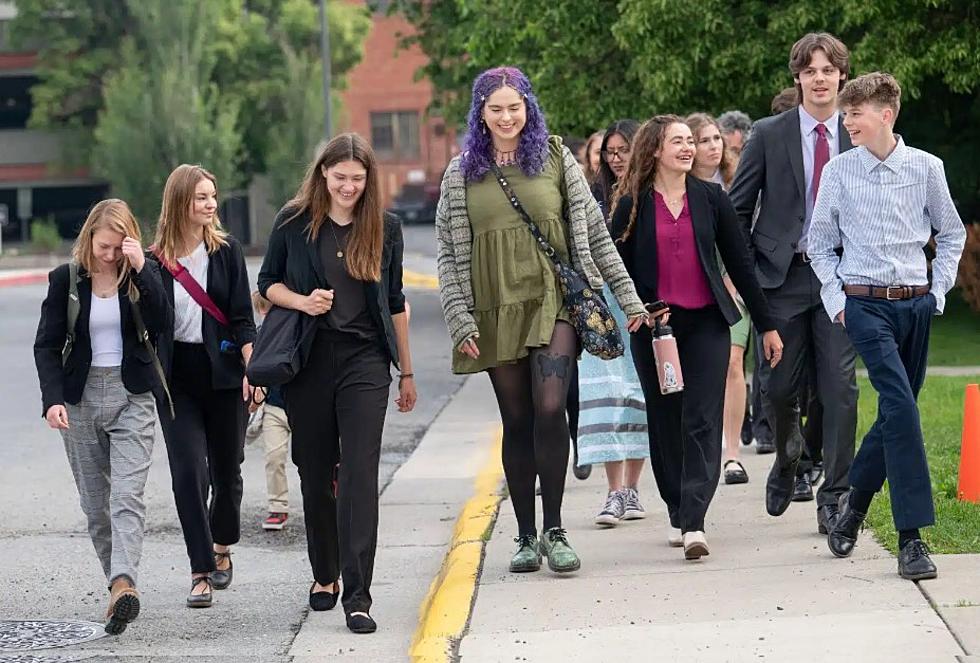
Montana SupCo denies state’s request to pause Held decision
Blair Miller
(Daily Montanan) The Montana Supreme Court on Tuesday denied a request from state officials to pause a district court judge’s ruling that the state is violating Montanans’ constitutional rights by not preserving a clean and healthful environment while the officials appeal the case to the high court.
In a 5-2 decision, the Supreme Court said it would not stay Lewis and Clark County District Court Judge Kathy Seeley’s August decision in the Held v. Montana case while the state prepares its appeal.
Five justices found that Seeley did not exceed the bounds of reason nor abuse the court’s discretion in siding with the 16 youth plaintiffs in the Held case, and that the State of Montana and other named defendants did not “provide good cause to disturb its ruling.”
Justices Jim Rice and Dirk Sandefur were the two justices who said they would have granted the motion to stay Seeley’s decision, but the other five on the court sided with the plaintiffs.
Last month, attorneys for the state, Gov. Greg Gianforte, the Department of Environmental Quality, Department of Natural Resources and Conservation, and Department of Transportation asked the Supreme Court to pause Seeley’s decision after she denied a similar request on Nov. 21.
The state argued that the court should put a pause on Seeley’s order being in effect because they believed the youth plaintiffs were trying to force the state to analyze greenhouse gas emissions and climate impacts when reviewing energy permits under the Montana Environmental Policy Act, and because performing those analyses is difficult and the order should be further clarified.
They also said that Seeley’s order exceeded her authority and “effectively grants plaintiffs the very ‘remedial climate recovery plan’ that the district court found it lacked power to grant.”
But attorneys for the youth plaintiffs said in response that the state did not file the motion in accordance with court procedures, nor did the state’s filing meet the standards for the Supreme Court to issue a stay.
“Defendants completely ignore the District Court’s factual findings and conclusions of law, based on undisputed trial testimony, detailing the current and ongoing infringement of plaintiffs’ constitutional rights,” the plaintiffs’ attorneys said in their response filing.
In Tuesday’s decision, the Supreme Court mostly agreed with the plaintiffs’ arguments.
The majority wrote that the state had not demonstrated that Seeley had abused her discretion in denying the request for a stay, nor had it explained why it would be “exceedingly burdensome to reimplement methods for greenhouse gas and climate impacts analysis when it had previously done so.”
The majority’s opinion also said it could not find that Seeley’s court abused its discretion “for failing to address an argument the state did not make” regarding the state’s contention that enjoining the state from enacting legislation constituted irreparable harm.
The opinion says the court could not conclude that Seeley’s court abused its discretion when weighing whether the state or plaintiffs had a more compelling interest in either upholding or staying the decision.
“We conclude that the District Court did not act arbitrarily or exceed the bounds of reason in weighing these factors and denying the State’s motion to stay,” the majority wrote. “Since the District Court did not abuse its discretion, the State does not provide good cause to disturb its ruling.”
Nate Bellinger, an attorney for Our Children’s Trust, one of the groups representing the plaintiffs, said the group saw Tuesday’s decision as “a positive step in the right direction” and said the attorneys look forward to getting their full appeal briefing before the court.
The Montana Attorney General’s Office, which has several attorneys representing the state and other defendants in the case, did not immediately respond to a request for comment Tuesday afternoon. A spokesperson for the governor’s office said the office does not comment on pending litigation.
The state’s appeal is due by Feb. 13, after which the plaintiffs will have 30 days to file their response.
